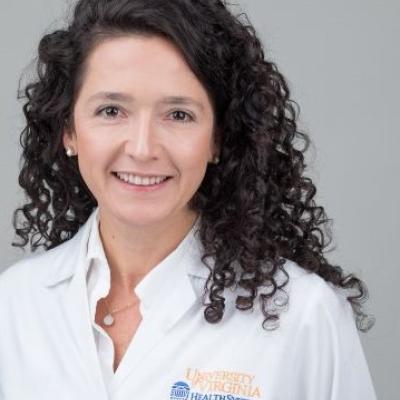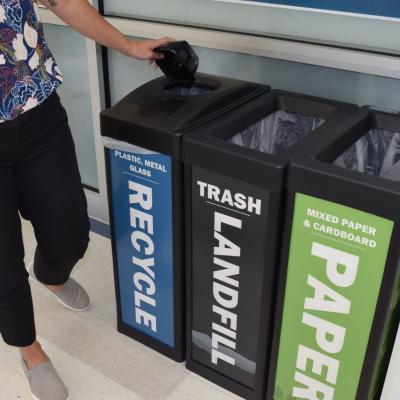
UVA Health clinicians are working to increase efficiency, reduce waste and generate cost savings, while continuing to ensure outstanding patient care, by incorporating sustainability into their departments.
By 3rd-year student Ben Nilson
More than ever, medical practitioners recognize the connection between environmental health and human health. While patient care remains first and foremost the priority at UVA Health, doctors are taking a step back and seeing the inextricable link between the environment and preemptive care, which involves addressing the underlying social determinants that influence patient health. A healthy environment can create tangible improvements in human health, and local clinicians are driving grassroots efforts to make their departments not only more sustainable, but cost-efficient as well.
Recycling in Radiology
Dr. Juliana Bueno, Associate Professor in the Radiology and Medical Imaging Department, sees incorporating sustainability not as elective, but as her responsibility. "At a time when climate change and natural disasters are part of our daily lives, not doing our part to help is not an option," she says. "Sustainability goes beyond climate and introduces a way of living our lives in a more conscious way, with awareness of our environment, our community and their needs. It impacts our well-being and the well-being of our community and out patients."
As a commitment to her patients, Dr. Bueno and a group of Radiology residents began a series of initiatives within the department to address these goals. In alignment with the University’s 2020-2030 Sustainability Plan, minimizing waste and increasing recycling in her department were the focus areas. Generally, as much as 30% of total waste from hospitals can be recycled, according to Practice Greenhealth, a sustainable health care networking organization. At UVA, the health system accounts for approximately 50% of the University's total waste.
Collaborating with UVA Recycling, Dr. Bueno added new recycling bins and relocated areas with greater access and higher activity. To minimize single-use plastics, the department installed eight new water-filtration systems to replace the water coolers that required 5-gallon plastic water jugs. Additionally, the department distributed approximately 600 reusable steel water bottles to faculty and staff as the annual Rad Tech Week gift. To increase awareness and engagement, the marketing department helped create informational slide decks to display on Radiology TVs. These initiatives will help avoid the purchase and transportation of about 360 5-gallon plastic water jugs each year, plus hundreds of single-use water bottles.
Through her work, Dr. Bueno was able to share her passion and successfully demonstrate how incorporating sustainability into workflow can increase efficiency. With the ongoing support of Radiology's administration chair, she will continue to integrate sustainable practice into the department's daily life.
The NICU
Other clinicians have also found ways to incorporate sustainability into their departments. Assistant Nurse Manager Rachel Benninger, RN, wanted to reduce landfill waste from the UVA Children's Hospital. In 2018, she launched a NICU Sustainability Initiative to increase recycling in the unit. In collaboration with UVA Recycling and the Office for Sustainability, bins were placed in high-waste areas. Benninger also led educational sessions and visual guides for staff members about what could be recycled and where.
Creating behavior changes can be difficult and takes time. Through trial and error, Benninger remained positive and emphasized the importance of recycling in the unit. After about a year, the NICU had recycling bins for paper and plastic items and frequent recycling services.
"The NICU seems to be the driving force in creating a climate of change throughout the 7th floor and the rest of the Medical Center," says Jason Snow, the recycling supervisor. "Enough cannot be said for having champions in each area that care enough about reducing landfill waste like your team members."
Sharps containers
After anticipating a disruption to UVA Health's supply of single-use sharps boxes during a supply chain shortage recently, staff found a way to transition to reusable sharps containers, installing 2,000 new containers to the University Hospital, Emily Couric Clinical Cancer Center and the Battle Building. Not only did the new containers allow patient care to be uninterrupted, but the transition also allowed for a reduction in hospital biohazard waste by avoiding the regular disposal of the single-use sharps containers.
The change also met the wider goals of the Supply Chain Work Group at UVA Health. "The kind of collaboration and partnership exhibited during the sharp box project will be essential as we purse a bevy of initiatives over the next fiscal year to drive clinical quality, increased product standardization, and cost savings," says Supply Chain Administrator Adam Momper.
Practicing green health
Sustainable practices like these go a long way in reducing UVA Health's total waste and reinforcing the system's commitments to environmental health and the well-being of patients and clinicians. In the words of Dr. Bueno, small steps lead to big accomplishments. "Introducing a cause that is full of purpose and meaning in our jobs leads to greater sense of satisfaction and that itself, is a huge benefit to all of us and especially to our residents." While she acknowledges changing culture can be hard, targeting personal habits is an important first step.
Thanks to the drive of resident clinicians, UVA Health is moving towards exciting, innovative and more sustainable patient care.
ben

Ben Nilson is a 3rd-year student majoring in Public Policy & Leadership and Global Sustainability. Within the Office for Sustainability, he works with Strategic Planning to help schools and units develop specialized plans to reach the University’s wider sustainability goals. Ben is interested in environmental justice and policy.


